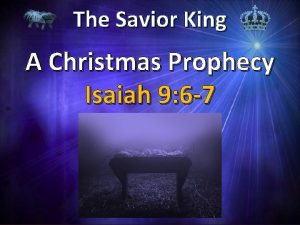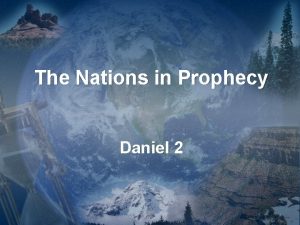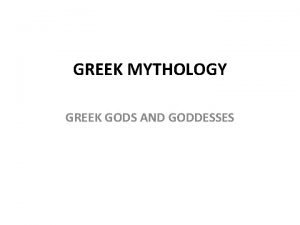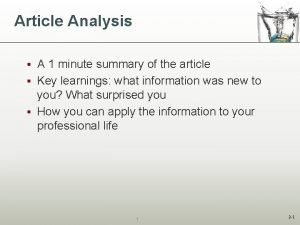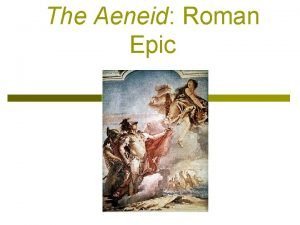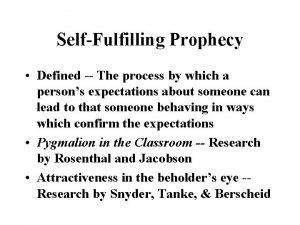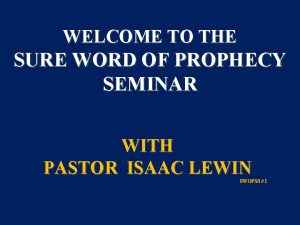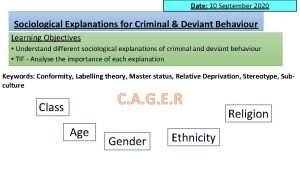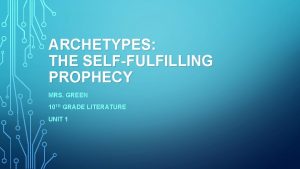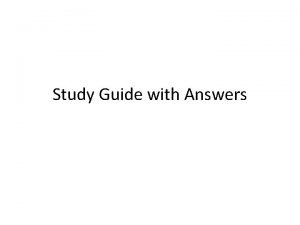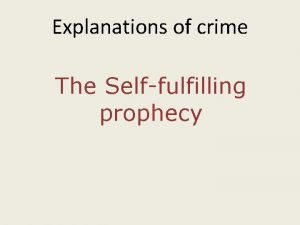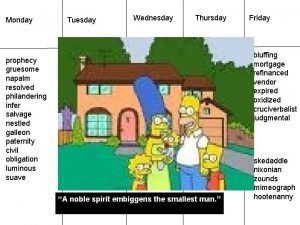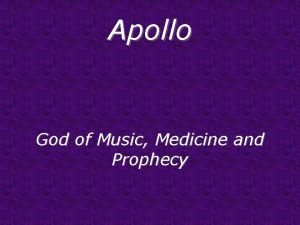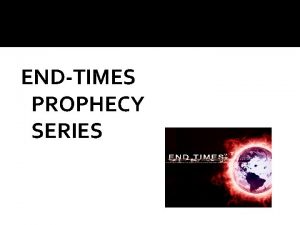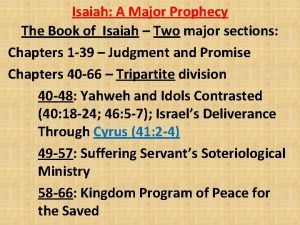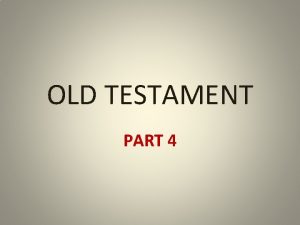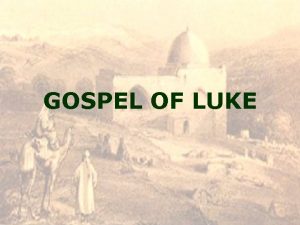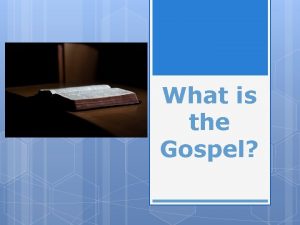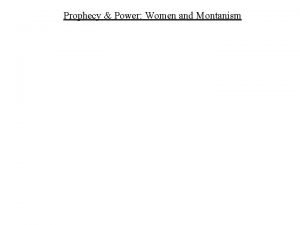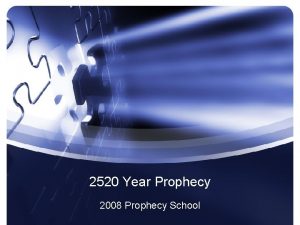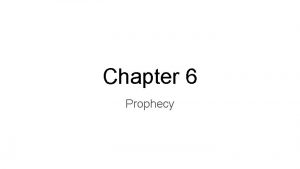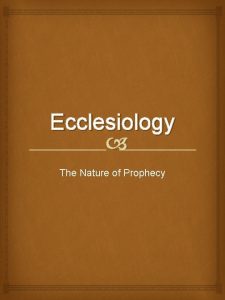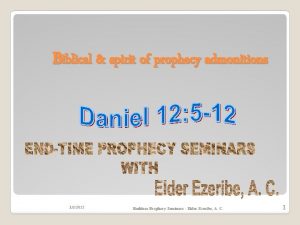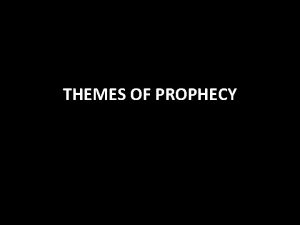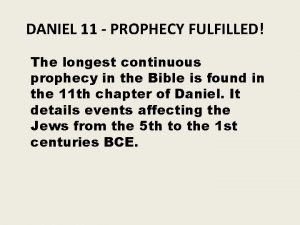Isaiah 53 the Gospel In Prophecy Although students




















![Verse two: • “He grew up [or came up] before Him” as a tender Verse two: • “He grew up [or came up] before Him” as a tender](https://slidetodoc.com/presentation_image_h/3333308a1e1acfc6a222df02ae02cc5d/image-21.jpg)












- Slides: 33

Isaiah 53, the Gospel In Prophecy • Although students commonly speak of Isaiah 53, the context of this magnificent passage includes 52: 13 -15. • These verses reflect the discussion in 52: 1 -12, but they belong more closely with what follows.

Some students refer to this as the fourth “Servant’s Song. ” • The other three Songs are in chapter 42, chapter 49, and chapter 50. • Actually there are more servants of the Lord referred to in these sections of Isaiah.

• Jacob, who is both God’s chosen servant (44: 1 -2). • And God’s deaf and blind servant (42: 18 -19), because often he will not hear the Lord’s instructions, nor see His ways. • Cyrus (45: 28; 45: 1).

In the previous Servant’s Songs, these points have been made: • Song one (42: 1 -4) - The Servant would come to perform a mission, and He would succeed. • The Spirit of the Lord would be upon Him (42: 1).

• He will bring justice or righteousness to the Gentiles (42: 1). • His methods will be different from the world’s (42: 2 -3). • He will not fail (42: 4).

Song two (49: 1 -7) - This Servant’s Grand Mission is difficult. • In this song there are great difficulties faced by the Servant, but we do not know yet what these difficulties are. • He is specially chosen by the Lord (49: 1, 3, 7).

• The Servant is specially prepared by the Lord (49: 1 -2). • He will be the salvation of the Lord to the ends of the earth for Jew and Gentile (49: 6).

Song three (50: 4 -9) - The Servant Himself speaks. • The Servant, who is taught of the Lord, teaches others to sustain them in their need (50: 4). • He is not rebellious to the Lord (50: 5).

• Yet He suffers degradation at the hands of others (50: 6). • We are not told why. • He will not be deterred from His work (50: 7 -9).

Isaiah 52: 13 -15. • The passage falls naturally into 5 distinct parts, each three verses long. • We will notice these sections one by one. • This section starts out with the exaltation of the Servant, and then presents His suffering, whereas in 53: 112, first we have the suffering and then His exaltation.

• The servant will “prosper. ” • In other words He will deal wisely. • His actions will be effective in accomplishing what He sets out to do (52: 13). • It is necessary to point out this fact because in succeeding verses he will appear as one whom men regard as punished for his own sins. • Because of His success, the Servant will be exalted; He will be lifted up very high (Phil. 2: 9 -11).

• The Servant would provoke astonishment among those who beheld Him (52: 14). • Isaiah uses deep contrasts. • Thus he moves from the very highest exaltation that this Servant will have to the very deep humiliation and degradation He will suffer.

• Note the contrast between the “many” and “thee. ” • This contrast is common in Messianic prophecies. • Though Jesus was one of us in that He was a man, He was also completely set apart from us, in that we were the problem, and He was the Solution, the only Solution. • He gave His life a ransom for all (1 Tim. 2: 6).

• His appearance and form would be so disfigured with His affliction that those who beheld would be struck with dismay and paralyzing astonishment (52: 14). • Men would regard the Servant as suffering this terrible suffering for His own sins. • Serious, indeed, must the sins of one be to bring such suffering. • Then to realize that the suffering of the Servant was actually for my sins, not His, would take the astonishment and dismay to a different magnitude.

In this way the Servant would startle many nations (52: 15). • Scholars are about equally divided over whether the word “startle” should be translated “sprinkle” or “startle. ” • If the meaning is “sprinkle, ” then the emphasis is upon the cleansing the Servant will bring to the nations.

• It seems very emphatic to me that the idea continues to be astonishment, because of the stress on astonishment in verse 14 and also continuing in the last half of verse 15: “That which had not been told them shall they see; and that which they had not heard shall they understand. ” • These lines are quoted by Paul in Romans 15: 21 simply to explain why Paul emphasized pushing on to new areas where men had not heard the gospel.

• Nations and kings would include all. • The world will be astonished at the suffering of the Servant. • The suffering of the Messiah, the severity of the suffering, and the true reason for the suffering will create astonishment in those who behold Him and learn the truth.

Isaiah 53: 1 -3. • The message in this chapter will deal first with the suffering of the Messiah, and then with His exaltation, exactly the opposite of 52: 13 -15. • In this section the point is that the Servant is despised. • Verse one is quoted in John 12: 38 to show that, as Isaiah had foretold, men refused to believe the Messiah, regardless of His signs.

• It is also quoted in Romans 10: 16 to show the Jews who disbelieved the gospel fulfilled the statement in the verse: “Who hath believed our message? ” • The idea is not who has believed what we have heard, but who has believed what we have reported.

• It seems clear to me that the second clause of the verse supports this idea because we have paralleled the ideas: the proclamation of the message and the revealing of the arm of the Lord.
![Verse two He grew up or came up before Him as a tender Verse two: • “He grew up [or came up] before Him” as a tender](https://slidetodoc.com/presentation_image_h/3333308a1e1acfc6a222df02ae02cc5d/image-21.jpg)
Verse two: • “He grew up [or came up] before Him” as a tender plant (53: 2 a). • “And as a root out of dry ground” (53: 2 b).

• It seems best to me to regard both of these parallel ideas as pointing to the unlikely prospects of such a one succeeding in growing and bearing fruit. • The One before whom the tender shoot grew would be God. • God protected Jesus as an infant from the efforts of Herod to kill Him, and preserved Him until the time for Him to be offered, and guaranteed His success, as one would nurture and care for a tender shoot.

• Almost certainly we should connect the idea of the tender shoot here with the “shoot out of the stock of Jesse” (Isa. 11: 1). • Jesus would come in an unexpected manner, in a way, that on the surface might appear to have no chance of success, as a root out of dry ground (Ezek. 17: 22 -24).

“He hath no form nor comeliness” (53: 2 b). • These words do not refer simply to the disfigurement of the Servant from His crucifixion, but just as the other words of this verse refer to the Servant’s whole life and mission, so these words do also. • The things that men commonly look for in their worldly heroes will simply not be in God’s Servant.

“And when we see Him, there is no beauty that we should desire Him” (53: 2 c). • The Servant of the Lord came unto His own, and His own received Him not (John 1: 11). • The question, “Can anything good come out of Nazareth? ” summarizes the idea. • The appearance of the Servant was such that man, judging from a wrong perspective, would completely misjudge him.

Verse 3: • “He was despised, and rejected of men” (53: 3 a). • To despise one means to set at nought whatever worth or dignity he has.

• This attitude on the part of the world and of Jesus’ own people led to their rejection of Him. • Think of the reaction of those passers-by at the cross. • He was neglected, ignored, rejected of men.

“A man of sorrows, and acquainted with grief” (53: 3 b). • Jesus was a man of sorrows, in other words a sorrowful man, and one who knew grief. • Of course, He chose to know the griefs any normal man must encounter upon earth, but this means more. • He knew the grief and sorrow over what men had become, grief over how sin had distorted and blinded them. • Think of those times that the Bible says, “He groaned within Himself” (John 11: 33, 38).

“As one from whom men hide their face he was despised” (53: 3 c). • This may be rendered, “he hid as it were his face from us, ” but such a translation does not fit the context. • The context is speaking of men’s reaction to Him, not His reaction to us.

• It seems to me that the grief suffered by Jesus so that men turned their faces away would involve more than the grief and sorrow He had over the sins of men. • It involves the grief of verse 10: “He hath put Him to grief. ” • In other words the grief and sorrow of His suffering.

• This thought takes us back to the last verses of chapter 52 in which His visage was marred by His incredible suffering, and men thought it was for His wrongs, when it was for ours.

“And we esteemed Him not” (53: 3 d). • We, His nation, the world - WE esteemed Him not. • The world was made through Him, and the world knew Him not (John 1: 10).

• He came unto His own, and His own received Him not (John 1: 11). • Neither the world, nor the Jewish nation, nor the Gentiles got the point until the deed was accomplished, and He was raised from the dead, and the gospel was preached.
 Rise and shine isaiah
Rise and shine isaiah Christmas prophecy isaiah
Christmas prophecy isaiah Isaiah's prophecy
Isaiah's prophecy Gone astray in the coastlands
Gone astray in the coastlands Dr miguel morayta rizal
Dr miguel morayta rizal Mountain peaks of prophecy
Mountain peaks of prophecy Messianic prophecy bible project
Messianic prophecy bible project What is the prophecy of simeon
What is the prophecy of simeon Uranus god of war
Uranus god of war Clem ferris
Clem ferris Self-fulfilling prophecy cycle
Self-fulfilling prophecy cycle Macbeth study questions acts 1-5 answers
Macbeth study questions acts 1-5 answers Aeneid author
Aeneid author The self fulfilling prophecy
The self fulfilling prophecy Lobsang rampa
Lobsang rampa The messianic prophecy bible project
The messianic prophecy bible project Messianic prophecy bible project
Messianic prophecy bible project Duncan key quotes
Duncan key quotes A sure word of prophecy
A sure word of prophecy Self fulfilling prophecy sociology
Self fulfilling prophecy sociology Self fulfilling prophecy psychology
Self fulfilling prophecy psychology Oedipus self fulfilling prophecy
Oedipus self fulfilling prophecy Endtimes prophecy
Endtimes prophecy Guinevere merlin
Guinevere merlin Self fulfilling prophecy psychology
Self fulfilling prophecy psychology How does banquo describe the witches
How does banquo describe the witches Messianic prophecy bible project
Messianic prophecy bible project Self fulfilling prophecy relationships
Self fulfilling prophecy relationships Prophecy antonyms
Prophecy antonyms 2520 prophecy
2520 prophecy When you hear communication what comes to your mind
When you hear communication what comes to your mind God of poetry music medicine and light
God of poetry music medicine and light End times chart
End times chart Who is persus
Who is persus

